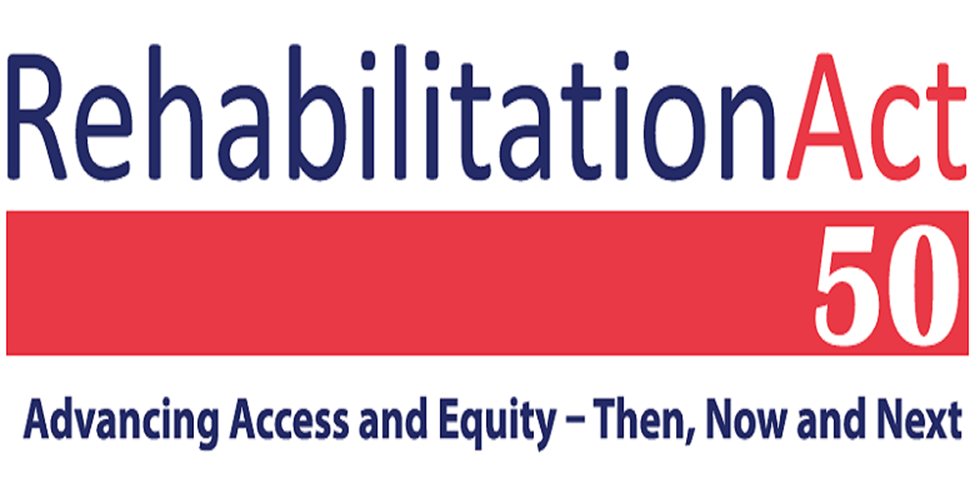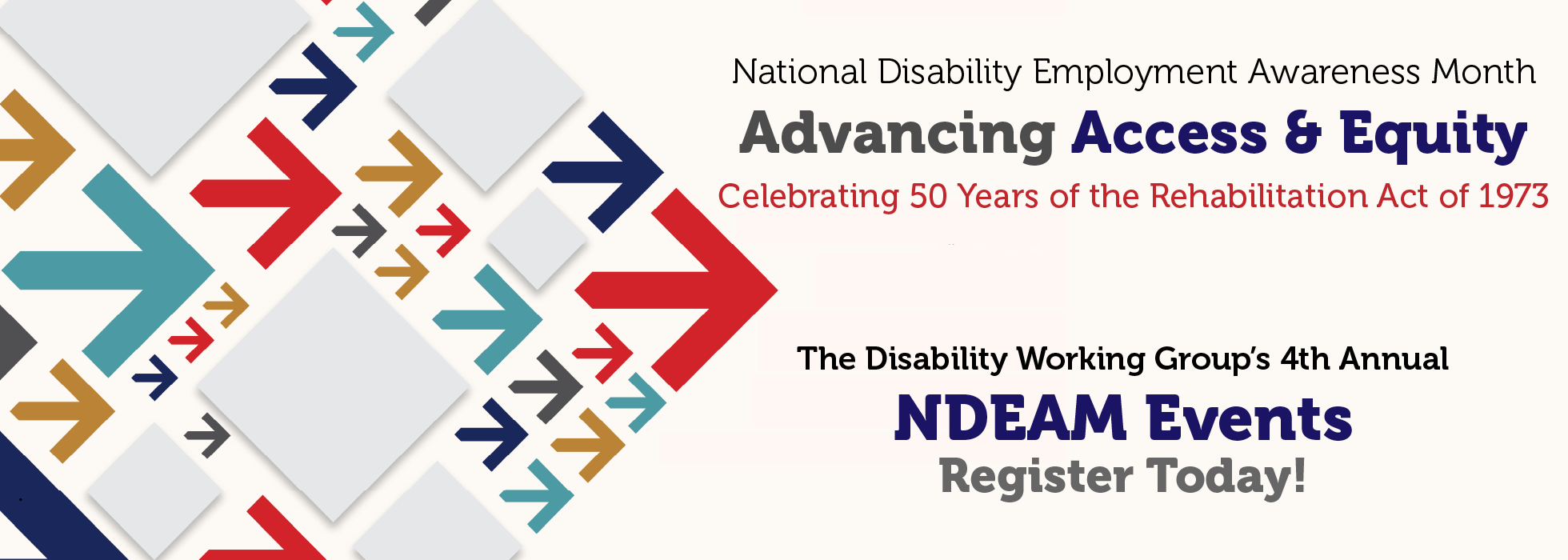Sent to All Students, Faculty & Staff - September 7, 2023
October is National Disability Employment Awareness Month
Celebrating 50 years of the Rehabilitation Act of 1973
Every October the US Department of Labor promotes National Disability Employment Awareness Month (NDEAM) which celebrates the contributions of America’s workers with disabilities past and present. NDEAM 2023 focuses on celebrating advancing equity an access 50 years after the passage of the first federal disability civil rights legislation - the Rehabilitation Act of 1973.
NDEAM Events
Sponsored by the Disability Working Group
Cosponsors: The Office of Equity & Access (OEA), the Employee Assistance Program (EAP), Stony Brook Medicine and Healthier U.
REGISTER TODAY!
Accommodation Requests: A Primer
Tues., Oct. 3 @ 11am
Location: via Zoom
Facilitators: Karin Martinsen & Natalie Mertens, OEA
The when, why and how of accommodation requests. Participants will learn the legal foundations of accommodations under the ADA, how Stony Brook University handles requests, manages ongoing accommodations and best practices for supervisors.
Healthier U. Chair Yoga
Thurs., Oct. 5 @ 11 noon
Location: via Zoom
Facilitator: Cathrine Duffy
Chair yoga is a form of yoga done while sitting or standing and using a chair for support. Chair yoga can improve flexibility, concentration, strength and mood.
Silktide, Other Tools, and Accessibility Success
To achieve success in attaining greater accessibility for your websites and web applications, the right set of tools are a necessity. In this talk, we will present how Silktide, combined with other accessibility tools, can help you succeed in creating and fixing your sites and apps so they are usable for all people.
Fostering Inclusivity and Accessibility in the College Classroom
Inclusive pedagogy aims to create a learning experience where all students feel valued, respected and engaged. In this presentation, we discuss strategies to create inclusive and accessible learning environments focusing on development of syllabi, assessments and instructional content. We will review Universal Design for Learning principles, accessible classroom strategies, and breaking down digital barriers.
Job Accommodation Network (JAN) Presents Pro Tips for Accommodation & Inclusion in the Hiring Process
Employers that are inclusive of individuals with disabilities can benefit from a wider pool of talent. Human resources professionals, hiring managers, and people leaders should be knowledgeable about disability inclusion, Americans with Disabilities Act (ADA) Title I compliance, and how to navigate the interactive accommodation process with job applicants and employees with disabilities. In this training, you will become familiar with the Job Accommodation Network (JAN) service, receive practical guidance on disability inclusion for candidates and employees, and learn pro tips for engaging in the accommodation process.
Understanding Hidden Disabilities in the Workplace
Tuesday, October 17 @ 11 am
Location: via Zoom
Facilitators: Alexis Rodgers, EAP
Not all disabilities are visible; most, from neurological disorders to mental health issues to non-apparent physical disabilities, are hidden. This session will highlight how awareness of hidden disabilities can help supervisors and coworkers build a more inclusive work environment.
Healthier U. Mindfulness
Tuesday, October 24 @ 11 am
Location: via Zoom
Facilitator: Cathrine Duffy
People of all ages and walks of life have discovered the life-changing benefits of Mindfulness Based Stress Reduction (MBSR), developed in 1979 by Dr. Jon Kabat-Zinn. Research shows that individuals who regularly practice mindfulness have decreased anxiety and depression, improved cognitive function, improved immune system function, decreased blood pressure and migraine frequency, reduced systemic inflammation, and improved coping with pain and illness. This session will provide an introduction to the practice.
Employment of People with Disabilities: A Panel DiscussionThurs., Oct. 26 @ 11 am
Location: via Zoom
Facilitator: Kristie Golden, PhD, LMHC, CRC
Leaders from Stony Brook University, Stony Brook Medicine and from the larger medical and business community will discuss topics related to employing people with disabilities and the challenges disabled employees and applicants face. Topics will include the impact of the Americans with Disabilities Act (ADA) on employment rates for persons with disabilities; concerns employees have about the disclosure of a disability; navigating the world of disability accommodation during a temporary disability; and ways that funding, focus and technology can improve employment for both people with disabilities and their employers. |
Panelists:Lynne N. Alba, MS
Director of Talent Acquisition, Hospital System Talent Acquisition, Stony Brook Medicine
Nakeisha Andrews
Sr Employment Services Manager /CESP, Family Residences & Essential Enterprises, Inc.
Joseph M. Delgado
Chief Executive Officer, Suffolk Independent Living Organization (SILO)
Teri Hughes
Senior Advisor, Northwell Health -South Oaks Hospital
Marjolie Leonard
AVP, Title IX and ADA Coordinator, Office of Equity and Access, Stony Brook University
Moderator:Kristie Golden, PhD, LMHC, CRC
Hospital Executive Administrator, Assistant Vice President, Operations, Neurosciences/Psychiatry,
Stony Brook Medicine
|
Register Here for All NDEAM Session
The Rehabilitation Act -Section 504September 23, 1973 - Today |
 |
The 50th anniversary of the Rehabilitation Act of 1973 marks a significant milestone in the ongoing fight for equal rights and opportunities for individuals with disabilities. Enacted on September 26, 1973, this landmark legislation laid the foundation for a more inclusive and accessible society.
The Rehabilitation Act prohibits discrimination on the basis of disability in programs and activities receiving federal funding. It has been instrumental in promoting accessibility, employment opportunities, and independent living for millions of Americans with disabilities. The Act's Section 504, in particular, has been crucial in ensuring equal access to education, employment, and public services.
Over the past half-century, the Act has undergone amendments and enhancements, adapting to the evolving needs and aspirations of the disability community. It has played a pivotal role in breaking down barriers and changing societal attitudes toward disability.
As we commemorate this 50th anniversary, it is essential to celebrate the progress made while recognizing the work that still lies ahead. The Rehabilitation Act's legacy is a testament to the power of advocacy, perseverance, and the belief in a more inclusive society where everyone can fully participate and contribute. Let us continue to build upon this foundation, striving for a future where disability is not a barrier but a facet of diversity that enriches our communities and nation.

